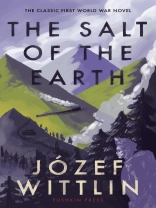The classic pacifist novel by a major Polish writer, who was nominated for the Nobel Prize
At the beginning of the twentieth century the villagers of the Carpathian mountains lead a simple life, much as they have always done. The modern world has yet to reach the inhabitants of this remote region of the Habsburg Empire. Among them is Piotr, a bandy-legged peasant, who wants nothing more from life than an official railway cap, a cottage, and a bride with a dowry.
But then the First World War reaches the mountains and Piotr is drafted into the army. All the weight of imperial authority is used to mould him into an unthinking fighting machine, forced to fight a war he does not understand, for interests other than his own.
The Salt of the Earth is a classic war novel and a powerfully pacifist tale about the consequences of war for ordinary men.
Józef Wittlin was born in 1896 and served in the Austro-Hungarian army during the First World War. His experiences inspired him to write The Salt of the Earth. Published in 1935 to great success, it received the Polish National Academy Prize, won Wittlin a nomination for the Nobel Prize, and has since been translated into 14 languages. Wittlin was also a translator and a poet, penning numerous essays including ‘My Lwów’, included in City of Lions, also published by Pushkin Press. With the outbreak of the Second World War he fled to France and then to New York, where he died in 1976.
Yazar hakkında
Jozef Wittlin (1896-1976), Polish novelist, essayist and poet, studied Philosophy, German, French and History of Art before he was drafted into the Austro-Hungarian army in 1914. Discharged from the army two years later on the grounds of poor health, he became a teacher and turned to writing, and published Polish translations of the Epic of Gilgamesh and Homer’s Odyssey in the 1920s. His novel Salt of the Earth (1936), has been translated into several languages and its American publication in 1941 resulted in awards from the Academy of Arts and Letters and the National Institute of Arts and Letters. Wittlin left Poland shortly before the outbreak of the Second World War, and eventually settled in New York City.












